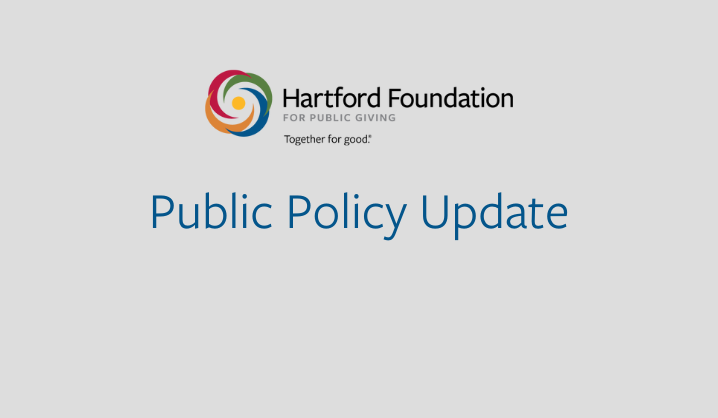New & Noteworthy

Hartford Foundation Submits Testimony on Legislation to Create Tax Incentives for the Construction of Grocery Stores in Food Deserts
Read the Foundation's Testimony
The Hartford Foundation for Public Giving submitted testimony to the legislature’s Human Services Committee on House Bill 6854: An Act Establishing the Office of Food Access and Tax Incentives for Grocery Stores.
As part of our efforts to dismantle structural racism and advance equity in social and economic mobility in Greater Hartford's Black and Latinx communities, the Hartford Foundation supports basic human needs in our region, applying an equity lens to the systems and programs that address access to food, housing, physical and mental health, and the digital divide.
While the Foundation and other philanthropic organizations have and will continue to support this work, the state must lead the effort to eliminate food insecurity. Public commitment must also address the interplay of basic human needs, including access to healthy, nutritious food, and provide adequate support to the nonprofit organizations delivering these services.
The Foundation offered testimony on House Bill 6854: An Act Establishing the Office of Food Access and Tax Incentives for Grocery Stores. Data shows that low-income residents in urban communities are the most vulnerable to not having access to healthy foods. Rising food prices and the lack of adequate transportation continue to make food insecurity a significant challenge in Hartford and other Connecticut urban communities.
Each year, the Foundation provides approximately $7 million in basic human needs grants to support both regional and local agencies in Greater Hartford. This past year, the Foundation awarded more than $1.4 million to support food programs that respond to emergency and short-term needs as well as food services during the holidays. (Other services supported by our basic human needs grants include emergency housing, fuel assistance, medical and dental services, employment counseling, clothing and other personal care items.)
In many of Connecticut’s urban communities, lower income residents, who often don’t have access to a car and are reliant on public transportation, face significant challenges accessing grocery stores, creating food deserts. Many city residents are located at least half a mile from the closest fresh food sources.
Over the past five years, the Hartford Foundation has been working with the City of Hartford, the Hartford Community Loan Fund, Trinity Health, the University of Connecticut, and other resident-led organizations to support the Healthy Hartford Hub ('HHH') Project, a collaborative effort to address Hartford's food desert and positively impact the health of Hartford residents, especially those living in the city's North End / Promise Zone neighborhoods. The plan was to recruit a national or regional grocery store chain and partner on the construction of a supermarket, a teaching kitchen, and a café that would offer shopping options for fresh foods and education on how to prepare them. The plan also included a pharmacy, medical clinic, exercise space and, possibly, housing.
As part of this effort, the Foundation provided support to the Healthy Hartford Hub’s Community Action Task Force (CATF), a group of North Hartford residents working to make real the vision of a wellness center anchored by a full-service grocery store. This years-long, resident-led, community-based participatory research project was coordinated by Kristen Cooksey Stowers, assistant professor in the University of Connecticut’s Department of Allied Health Sciences. The researchers gathered survey data, quotes, and pictures to tell a bigger story of neighborhood resilience and demonstrate a future of thriving together as a result of community and economic development for health and equity.
While residents have expressed the need for a grocery store in the north end of downtown Hartford, as well as extensive efforts made by the City and community partners, there is still no supermarket construction planned for this location. House Bill 6854’s proposal to offer tax incentives to grocery store companies willing to construct a facility in a food desert could be a useful tool to creating greater access to healthy foods where access is incredibly limited.
The Hartford Foundation is ready to partner with legislators, the administration, advocates, philanthropy and other stakeholders to prevent and eliminate food insecurity. We also invite policymakers to meet with us to understand and discuss how philanthropic dollars can fill gaps in equitable strategies to support Connecticut residents that may not be best suited for public dollars.
